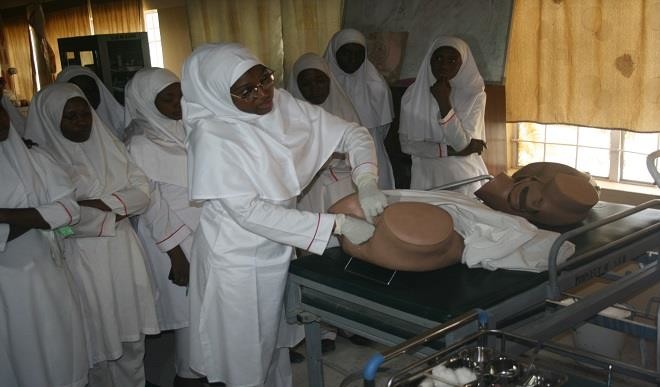
Rural women in Kano, Katsina, Jigawa, Yobe and Zamfara states have taken a deeper sigh of relief following a decision by their respective governments to train 6,500 female health workers to man healthcare facilities in different communities across the five states.
The development was sequel to a partnership between Women for Health (W4H), a UKaid funded nongovernmental organization and the five state governments, Kano Chronicle, observed.
Already, over 2,000 female health workers have been trained under the programme tagged Foundation Year Programme (FYP) and posted to different healthcare facilities across the five states, while over 3,000 others are currently undergoing the training.
Also, over 20 healthcare training institutions comprising colleges of nursing and midwifery and schools of health technology across the five states have been supported under the programme.
Kano Chronicle gathered that the support was in terms of infrastructural development and capacity building of staff to be in tune with contemporary development in the health sector.
Rural communities in the five states are said to have suffered acute shortage of professional midwives in their primary healthcare centers, thereby forcing expectant mothers to largely depend on traditional birth attendants for their delivery.
This dearth of female health workers coupled with the tradition of the people, where cultural norms abhor woman from being attended to by a male health service provider, have worsen the process of health care delivery in rural communities, hence increasing cases of maternal death among the women populace.
The National Programme Director of Women for Health, Dr Fatima Adamu expressed concern over dearth of man power in the rural healthcare facilities, blaming the scenario for various cases of birth complications or eventual deaths of women and children in the communities over preventable issues.
She observed that majority of health workers in the states live in urban areas even when their places of assignments were in rural communities thereby depriving rural women of adequate care during pregnancy and child-birth.
‘’We recognized that in all the five states we are working including Kano, Jigawa, Zamfara, Yobe and Katsina, majority of their health workers are in the urban areas. In fact, more than 80-90% of midwives in these states are residing in the state capitals.
“It is very common therefore to have a whole local government without a single midwife, and the implication is that if there is no midwife the women in rural areas are giving birth without birth attendants which means if there is any complication there would be nobody to attend to them,’’ she said.
When our reporter visited some of the communities and schools the NGO has provided intervention in Kano, Jigawa and Yobe states recently, the residents expressed hope for better days ahead, saying now that their children were manning the health facilities their fears and anxieties would soon be overcome.
Maryam Ahmadu is a resident of a village in Kunchi local government area who lost her first child and suffered a lot due to prolonged labour in the hand of a traditional birth attendant in her village.
She said “Though we have a big primary healthcare facility in this area, we don’t have trained midwives to receive deliveries at the facility. We have been battling with this problem for almost five years,’’ adding that even when some were posted to the village, they would only stay for few months and then fight their ways back to the city leaving the expectant mothers at the mercy of traditional birth attendants.
She said with the coming of Hadiza Abdullahi who had passed through the Foundation Year Programme (FYP) of W4H, more women were being encouraged not to only come for delivery in the health facility but to also ensure they access ante-natal services as well.
Another resident, Malam Nasiru Yunusa Kunchi expressed delight over the W4H’s initiative for training rural young women to take charge of local challenges in their communities.
He described it as a ‘’double edged sword’’ for fighting not only health concerns but also the evil of unemployment and education for girl child in the north.
‘’I am much encouraged by this initiative especially as it matters to the issue of girl child education. We do not take serious issue of girl child education that perhaps explains why we are facing a lot of difficulties. In our health facilities, we don’t have women to attend to our wives.
‘’Before now any serious birth complication from Kunchi is referred to Dambatta or Kazaure in Kano and Jigawa states, but courtesy of this partnership between state governments and W4H all births are received here by Hadiza and her colleagues, AlhamdulilLah (all praise be to Allah),’’ he said.
On her part, Hadiza Abdullahi one of the pioneer products of W4H’s health workers training scheme, currently working as a professional midwife at Kuchi Primary Healthcare Centre, said she was inspired into the profession because of the difficulties her people were facing over the years when it comes to child delivery.
She said anytime a woman was in labour, especially during late hours, it used to be very difficult for her to access professional care givers as most of the birth attendants then lived in the city.
“Before I came here, women in labour were being attended to from morning to evening. At that time there was only one woman working in the ante-natal unit, anytime there is a case she would come and attend to the woman to deliver and after the closing hours she would go because she was not staying in Kunchi. So you can imagine how difficult it could be if a woman starts labour in the night, but since I come here anytime there is a problem, irrespective of the hour, I would come and attend to it and by that I think we have improved’’ Hadiza said.
She encouraged parents to allow their children to further their education, saying it was the only way social problems confronting the society could be overcome.
Speaking on some of the areas W4H has improved the quality of training at health training institutions, the Principal, School of Basic Midwifery Kano, Hajiya Manubiya Abdullahi Jibril, said “They helped in equipping the school so that we can bridge our accreditation gap because equipment are part of the criteria that is used to assess whether school is capable of training or not.
“There are schools that their accreditation rights were withdrawn as a result of debilitating structures or lack of equipment but I want to tell you that from the time we started having collaboration with W4H till date the school has its accreditation right.
“In terms of human development we enjoyed a lot of workshops to improve the quality of teaching; they support some of our staff in the area of paying their registration fees, in the areas of seeking admission into various institutions.
“When it comes to the facility itself, renovation of the facility was done by the W4H in collaboration with the state government.’’
Deputy speaker, Yobe state House of Assembly, Dr Ibrahim Garba Kurmi called on other states in the north to replicate W4H’s Foundation Year Programme in order to overcome the challenge of shortage of health care service providers at grass root level.
‘’One of the problems we are having in our rural communities is shortage of man power, and apart from that there is no quality of manpower especially in rural areas so the objective of this programme is to increase the number and quality of women to go and study health courses in schools of nursing or midwifery or colleges of health sciences so that at the end of the day we will have some rural women who are going to take care of primary health care facilities” he said.
He reiterated the commitment of Yobe state government towards sustaining the foundation year programme saying the state’s House of Assembly had already passed a bill in order to facilitate the sustainability of the programme.
Speaking in the same vein,the District Head of Dutsinma, Katsina state, Alhaji Sada Mohammed Sada expressed satisfaction with the FYP scheme, saying it had started yielding results in addressing manpower shortage in rural health facilities across state.
He therefore enjoined parents to take, as a matter of priority, the education of their children especially girl-child, saying it would significantly help in saving pregnant women from preventable death during child birth.




